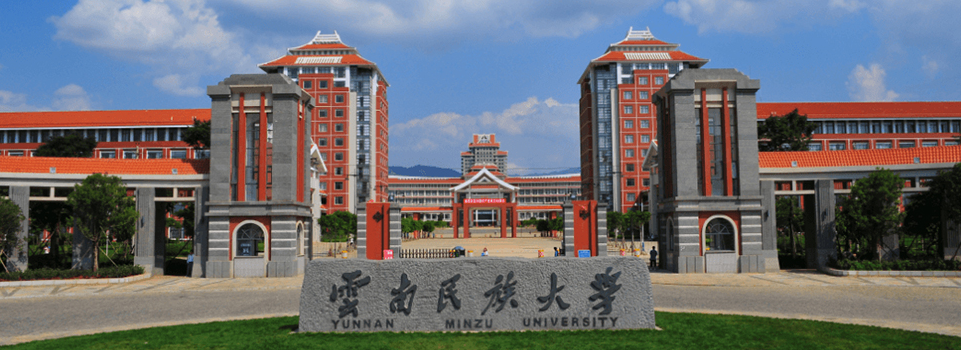About the University
Yunnan University of Nationalities (YUN) is a comprehensive institution of higher learning for all Chinese ethnic nationalities including the majority Hans. Founded on August 1, 1951 in Kunming, a beautiful city known for its mild spring weather all year round, YUN is a key provincial university established jointly by the State Ethnic Affairs Commission and the People’s Government of Yunnan Province, and among China’s earliest universities of ethnic nationalities as well as an academic institution under the state’s planning for accession to PhD programs.

The leaders of the Communist Party China (CPC) and the Chinese government have been showing their solicitude for the construction and growth of YUN. including Mao Zedong, Liu Shaoqi, Zhu De, Deng Xiaoping and Jiang Zemin, who once met faculty and student representatives at YUN; Zhou Enlai, Peng Dehuai, Chen Yi, Panchen Erdeni Chosgyi Gyantsen, Li Lanqing, Li Tieying and some other central government leaders, who inspected YUN and were concerned about the life of the ethnic students and teachers as well as the development of this university. At the beginning of YUN’s establishment, the CPC Yunnan Provincial Committee and the Provincial Government appointed General Zhou Baozhong, then a vice governor of the province, as the first president of YUN, and General Zhang Chong and Mr. Wang Lianfang as vice presidents, and they have continued to offer their support for the development of all aspects of the university.
Through development over the past half a century, YUN has grown into a comprehensive university with multi-disciplinary, stratified and diversified programs. YUN now offers 1 joint doctoral program, 50 master programs,2 professional master degree programs(namely M.B.A and J.M )and 60 bachelor programs ranging from philosophy, economics, law, education, literature, history, science, engineering, to management, 12 out of which are provincial high-grade disciplines, 8 are national characteristic specialties, 14 are provincial high-grade characteristic specialties, at different levels ranging from two-year and four-year undergraduates, postgraduates for master and doctoral degrees, and international study programs. Now YUN has 15,000 full-time domestic students (over 50% of the full-time undergraduates are ethnic minorities.), 12,000 part-time domestic students for continuing education, and over 200 international students from more than 10 countries. YUN mainly consists of 20 schools (divisions), one affiliated research institute, one ethnic museum housing nearly 20,000 pieces of cultural relics, 42 research centers under the university, and one training base for China-ASEAN linguistic and cultural talents. The 20 schools (divisions) mainly include: School of Philosophy, School of Economics, School of Law, School of Education, School of Physical Education, School of Humanities, School of Ethnic Cultures, School of Foreign Languages, School of Southeast and South Asian Languages & Cultures, School of Arts, School of Mathematics & Computer Science, School of Electrical & Electronic Information Engineering, School of Chemistry & Biological Technology, School of Management, School of People’s Armed Forces, School of International Education, School of Vocational & Technical Education,School of Continuing (Preparatory) Education, Department of Graduate Affairs, and Department of Marxism-Leninism Studies.
The facilities of the university have been continually upgraded over the past 50-odd years. YUN occupies a land area of 2,500 mu (145 hectares) with a floor area of 550,000 square meters. It comprises teaching and research facilities worth a total of RMB100 million, a library collection of 2 million books, 3,000 computers for teaching, languages labs with 1,200 seats, and multimedia classrooms with 9,000 seats. Among a faculty and staff of 1,000-odd, over 150 are professors or research fellows and over 300 are associate professors. YUN also boasts a number of scholars well-known at home and abroad in ethnography, history, sociology and other disciplines, including Professor Ma Yao, an eminent ethnologist, historian and educator; Professor Wang Ningsheng, a famous ethnologist and archaeologist; Professor Xie Benshu, an outstanding historian; and Professor Zhang Jianguo, a distinguished scholar of Chinese modern and contemporary history YUN has invited more than 100 honorary professors and guest professors from domestic and international universities or research institutions including the Chinese Academy of Social Sciences, Peking University, Tsinghua University, and Seoul National University.

